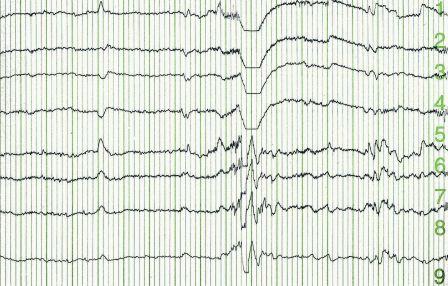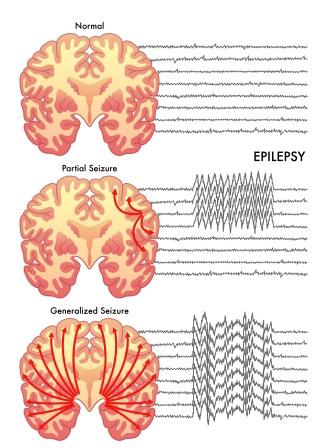Epilepsy – Ayurvedic Understanding And Its Treatment
Article by – Dr. MS Krishnamurthy MD (Ayu), PhD (Ayu).
Ayurvedic treatment for epilepsy has been mentioned by ancient Ayurvedic masters such as Acharya Charaka and Acharya Vagbhata. There exists a complete plan of Ayurvedic treatment for epilepsy.
Table of Contents
With Modern medicines
Please note that the below-mentioned treatments and medicines of Ayurveda are useful. If the patient is already taking allopathic medicines for epilepsy, then she needs to continue it while starting with Ayurvedic medicines. To switch entirely to Ayurvedic medicines, it may take several months. Abrupt stopping of allopathic medicine is not recommended.
Introduction
Epilepsy is a condition where transient loss of consciousness is found for certain period of time which may last from few seconds to few minutes. An epileptic attack is an abrupt and excessive electric discharge of cerebral neurons. Ayurveda explains epileptic attacks as Akshepaka (convulsions) and the syndrome is termed as ‘Apasmara’.
Acharya Charaka defined this condition as a disorder with the characteristic features of occasional loss of consciousness associated with suspended memory, intellect and mind. It is presented with the cardinal features of loss of memory (consciousness) by feeling or entering into darkness with involuntary movements.
Ayurvedic prevention tips
Ayurvedic prevention tips for epilepsy patients:
While going out on a sunny day, wear goggles to avoid sun glare or use a hat.
As far as possible, avoid flashing lights.
Sleep for at least 6 – 7 hours.
Have food rich in omega 3 fatty acids – fish, flax seeds, walnuts, sardines, soyabean, tofu, shrimp, brussels sprouts, cauliflower, winter squash.
Have foods rich in Vitamin E – Sunflower seed, almond, pine nuts, peanuts, spinach, taro root, flaxseed oil, soyabean, pistachio. Broccoli, carrots, chard, mustard and turnip greens, mangoes, nuts, papaya, pumpkin, red peppers, spinach, and sunflower seeds
Include ash gourd seeds in diet. It should be available online, please do a search.
Use lukewarm water for bath – neither too cold, nor too hot.
Do not skip meals or night sleep.
Do not skip medicines.
Have good amounts of butter, ghee, margarine, oil and cream.
Decrease high sweet foods and carbohydrates
Chapati is better than rice.
Slightly decrease amount of proteins.
Causative factors
- Consumption of unwholesome food and habits for a longer period by person who has delusional mind
- Long term grief, passion and anger
- Subconscious fear
- Subconscious hatredness
- Unethical regimens and celebrations
- Unethical recreations
- Debilitated mind
- Irregularly over excited doshas etc.

Origin of the disease
Aggravated doshas get accumulated in bran and produce the features based upon Doshic predominance. Then it exerts illusion of the mind and visual hallucination and seizures (tonic spasms and clonic jerks). Often it is presented with out warding tongue, deviation of the eyes, dribbling of saliva with froth, tonic and clonic movements of limbs etc. Usually, this attack phase lasts for few seconds to few minutes. Later it passes on to relaxation phase where the person goes to normal sleep.
Premonitory symptoms
- Contracted eyebrows
- Continuous deviation of the eyes
- Auditory hallucination
- Salivation and nasal discharge
- Loss of interest in food
- Sensation of spasm or congestion of heart
- Gurgling sound in the abdomen
- Fatigue
- Pain all over the body muscles and joints
- Hallucination
- Feeling of darkness
- Fainting
- Giddiness
- Dreams of intoxication, dancing, stabbing, falling etc.
Important features of Apasmara
- Convulsions with teeth biting
- Dribbling of frothy saliva
- Expiratory dyspnea
- Roughness of the body
- Red or black discoloration of the body surface
- Involuntary speech or murmuring
- Head retraction to one side
- Constriction of the fingers
- Unstable movements of the limbs etc.

Classification
Based up on the doshic features, vataja, pittaja, kaphaja and sannipataja (mixed features of all the three doshas) varieties can be found in the practice. Based upon the doshic dominance, symptoms are produced.
Herbal treatments
Severe purgation, emesis and errhines (vamana, virechana and nasya)
Assurance(Ashwasana)
Specific formulations to strengthen the body and mind (balakaraka oushadha)
Rejuvenatory therapy(rasayana)
Single drug usage
Single drugs referred for apasmara:
- Vacha- Acorus calamus Linn.
- Shankhapushpi- Convolvulus pluricaulis Chosis.
- Kooshmanda-Ash gourd– Benincasa hispida (Thunb.) Cogn.
- Jyotishmati- Celastrus paniculata Linn.
- Yastimadhu- Glycyrrhiza glabra Linn.
- Jatamamsi- Nardostachys jatamansi Dc.
- Tagara- Valeriana jatamansi Jones.
- Lashuna-Garlic- Allium sativa Linn.
- Amalaki-Gooseberry- Emblica officinalis Gaertn.
- Rasna- Pluchea lanceolata C. B. Clarke.
- Hingu-Asafetida- Ferula narthex Boiss.
- Choraka- Angelica glauca Edgew.
- Kushta- Saussurea costus (Fale.) Lipsch.
- Phalgu-Fig- Ficus carica Linn.
- Brahmi- Bacopa monnieri (Linn.) Pennell.
Ayurvedic formulations
Formulations recommended for apasmara:
- Panchagavya ghrita
- Mahapanchagavya ghrita
- Kalyanaka ghrita
- Kooshmandaka ghrita
- Brahmi ghrita
- Saraswatarishta
- Smritisagara rasa
- Brahma rasayana etc.
Formulations from Sahasrayoga textbook
- Tiktaka Ghrita
- Mahatiktaka Ghrita
- Dhanvantari Ghrita
- Kalyanaka Ghrita
- Mahakalyanaka Ghrita
- Lakshadi Taila
- Mahalakshadi Taila
- Vranabhairava Taila
- Mritasanjeevani Gutika
Wholesome diet and habits
- Old rice (purana shali)
- 60 days rice (shashtika shali)
- Wheat (godhuma)
- Green gram soup (mudga yusha)
- Drum stick (shigru)
- Cow’s milk (goksheera)
- Cow’s ghee(goghrita)
- Grapes(draksha)
- Fig(phalgu)
- Pomegranate(dadima)
- Gooseberry(amalaki)
- Rest(vishrama)
- Wholesome and fresh food (pathyaahara)
- Cold water bath (sheetala jala snana)
- Smoothening music (manohiatakarani) etc.
According to Yogaratnakara
Red rice, green gram, wheat, old ghee, meat of tortoise, soup of meat of animals living in desert like lands, milk, water hyssop leaves, calamus, pointed gourd, old pumpkin, mexican tea, sweet pomegranate, drumstick, coconut water, grapes, Indian gooseberry, Phasla fruit etc.
Unwholesome food and habits
- Heavy food (guru ahara)
- Incompatible food (viruddhahara)
- Alcohol (madya)
- Fish (matsya)
- Suppression of thirst and appetite (vega-kshutvega dharana)
- Insult of teachers and elders (guru-vriddhapachara)
- Unethical activities (abhichara)
- Sleeplessness (anidra)
- Tiredness (shrama)
- Excess work (ativyayama)
- Mental irritation(chinta) etc.
According to Yogaratnakara
Alcohol, fish, diet which interrupts the tissue metabolism, food which has penetrating, hot and heavy to digest qualities, excessive exercise, sternous work, not respecting the god, teacher, elders etc.,leafy vegetables, ivy gourd, blackgram, pigeon pea, suppressing the urges of thirst, sleep and hunger etc.
Last drop
Epilepsy is a diseased condition which needs long term medication. People often take the medicine for few weeks to few months and suddenly withdraw on their own, thinking that their complaint is cured. But, underlying pathology will not be checked completely. This leads to sudden manifestation of the attacks and hence the patient has to restart the medication. So, it is an illness which requires constant supervision by the psychiatrists and physicians. Also, it is mandatory to take the medicines for few years of time. Half knowledge about the disease is dangerous to the individual and the family as well.







19 comments
aarti
Gdmrng Dr.
All your articles are very meaningfull.u tell aboit the root cause of disease.plz sir tell us about the chloestrol and hair fall.
regards,
aarti
HEERALAL A BOHRA JAIN
VERY INFORMATIVE. THANKS. kindly GUIDE ME FOR OBESITY
Dr J V Hebbar MD(Ayu)Author
Hi, I have written many articles about obesity. Please read them here – https://www.easyayurveda.com/obesity-health/
Dr J V Hebbar MD(Ayu)Author
That is a really great point.
Thanks for bringing it to my notice. I will surely consider.
Best regards
Jasvir Singh
What is the meaning of oil pulling?
Dr J V Hebbar MD(Ayu)Author
Read here – https://www.easyayurveda.com/2013/08/16/how-to-do-oil-pulling-in-genuine-ayurvedic-way-9-tips/
Dr J V Hebbar MD(Ayu)Author
Hi, Panchagavya ghrita – 5 drops in the morning can be given while continuing the allopathic treatment. But because the child is too young, please do not take chances with online advice (including mine) and consult an Ayurveda doctor directly.
Dr Malini Bhat
Dear sir, I would advice you to consult an ayurvedic physician for the above said complaint. Because as we all are genetically different with different constitutions and patterns, we respond to treatments in many different ways. As here we are talking about a child an expert supervision is intended.
Dr. Yogendra prakash
Hi sir,
Is sirodhara is helpful in epilepsy
harihar B.
Sir
A very good article, with lot of precautions. I have a doubt – whether ayurvedic remedies can go side by side with allopathic treatment by epilepsy patients.
Yours sincerely,
harihar
shijan
Sir can you pls tell us to prevent sezure in kids?
Dr J V Hebbar MD(Ayu)Author
There are a few effective medicines. If thekid is already is taking Allopathic medicine, then Ayurvedic medicines can be supplemented. Please consult an Ayurveda doctor directly.
Victoria
Hello Dr, hope you are doing well. Last July I had a seizure. Last December I had a revelation while doing yoga, by Seane Corn. Can seizures be caused by unbalanced chakras? Thank you for your article, very informative and helpful!
Dr J V Hebbar MD(Ayu)Author
It could be Prapaundarikadi taila or balahatadi taila. But I am not sure. Please consult an Ayurveda doctor directly.
Lakhwinder
My name is lakhwinder Singh my son have start siezures when he is only 7 days old.any ayurvedic treatment for him please advise me.
Thanks
Sweta
Hi
I am 34 years female with twins.I have epilepsy from std 7.Till now i get epilepsy once in 2-3 years very rarely.Doctors say it hapens due to discontinue of medicines or stress.
But i never discontinued and always get a sound sleep.Then why i get this attimes.
dr nirmala kushwah
could be prescribe Panchkarma therapies for epilepsy contextually?
Dr J V Hebbar MD(Ayu)Author
Yes, surely.